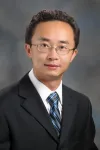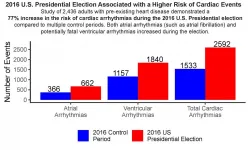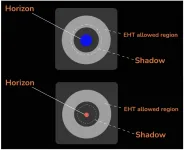(Press-News.org) We observe water vapor condensing into liquid droplets on a daily basis, be it as dew drops on leaves or as droplets on the lid of a cooking pot. Since the work of Dutch physicist J.D. van der Waals in the 19th century, condensation has been understood to result from attractive forces between the molecules of a fluid.
Now, an international team of researchers has discovered a new mechanism of condensation: Even if they don't attract each other, self-propelled particles can condense by turning toward dense regions, where they accumulate. The study was published in Nature Physics.
"It's like if cars steered toward crowded areas and made the crowd even bigger," explained Steve Granick, director of the IBS Center for Soft and Living Matter in Ulsan, South Korea. Self-propelled particles have internal engines that allow them to move on their own. Examples include bacteria, mammalian cells, and even humans. Systems of self-propelled particles are an example of active matter -- a growing field of research.
In the past decade, researchers have sought to understand condensation, or liquid-gas phase separation, in active matter. Early work revealed that, unlike passive fluid molecules, self-propelled particles can condense even if they do not attract each other.
Previous work showed that "motile particles collide with one another and get stuck in the collision for a while, allowing other particles to join in and create a traffic jam," said Ricard Alert, a postdoctoral research fellow at the Princeton Center for Theoretical Science and one of the new study's co-first authors.
"In these systems, the particles separate into two phases: dense clusters where they can barely move, and a dilute gas where they move fast," explained Ned Wingreen, Princeton University's Howard A. Prior Professor in the Life Sciences.
In the new work, the research team studied self-propelled particles synthesized in the lab. "We took microscopic glass spheres and we coated one hemisphere with a thin metallic layer," explained Jie Zhang, a postdoctoral research fellow at the University of California at Santa Barbara, USA, and a co-first author of the study.
The particles have a glass face and a metallic face; they are known as Janus particles in honor of the two-faced Roman god.
When the researchers applied an electric field, the particles started running with their glass face in front and their metallic face on the back. As expected, the particles immediately started condensing into clusters. However, the researchers were surprised to see that, unlike in dense traffic jams, particles in the clusters kept moving quickly.
"Rather than jammed, the clusters were teeming with particles that continuously moved in and out," Zhang said. "This finding was both exciting and intriguing."
The observation meant that slower motion of particles in clusters could not explain condensation in this case, which prompted the team to develop a theory for the collective behavior of active Janus particles. The team discovered that, rather than getting stuck like in a traffic jam, particles rotate toward dense areas. The particles reorient and then self-propel toward the crowd.
"This is a new mechanism of condensation that is based on how particles reorient each other," said Alert. "This finding brings a new idea into the field, showing that not only forces but also torques can produce condensation and liquid-gas phase separation."
The new mechanism allows particles to keep moving even in dense clusters. The researchers are therefore hopeful that their findings will guide future work to self-assemble dynamic groups of active agents, from microscopic particles to humans and robots, that rapidly enter and exit a cluster.
"Such a fast turnover might prove useful as a strategy for an efficient exchange of information between individuals in a group," Granick said.
INFORMATION:
The study, "Active phase separation by turning towards regions of higher density," by Jie Zhang, Ricard Alert, Jing Yan, Ned S. Wingreen and Steve Granick, was published online May 20, 2021, in the journal Nature Physics. DOI: 10.1038/s41567-021-01238-8
Antiretroviral therapy, the common approach in the treatment of HIV, halts replication of the virus and has saved the lives of millions of people. However, for patients the drug cocktail becomes a lifetime necessity because they continue to harbor latent HIV in a small number of immune system cells. In the absence of treatment, HIV can again replicate and rebound into full blown AIDs.
A new study, however, suggests that addition of a single small molecule can rip away the cloak that shields those cells containing HIV and make them susceptible the patient's own antibodies that otherwise are not normally of much use against HIV.
For the study, a team of researchers ...
HOUSTON - Researchers at The University of Texas MD Anderson Cancer Center have developed a first-of-its-kind artificial intelligence (AI)-based tool that can accurately identify rare groups of biologically important cells from single-cell datasets, which often contain gene or protein expression data from thousands of cells. The research was published today in Nature Computational Science.
This computational tool, called SCMER (Single-Cell Manifold presERving feature selection), can help researchers sort through the noise of complex datasets to study cells that would likely not be identifiable otherwise.
SCMER may be used broadly for many applications in oncology and beyond, explained senior author Ken Chen, Ph.D., associate professor of Bioinformatics ...
A national study from researchers at Michigan Medicine found that nearly 3% of insured U.S. adults under 65 take medications that weaken their immune systems.
The findings, published in JAMA Network Open, are based on data from over 3 million patients with private insurance. They focus on patients' use of immunosuppressive drugs, including chemotherapy medications and steroids such as prednisone.
The analysis reveals nearly 90,000 people met the study criteria for drug-induced immunosuppression that may elevate risk for severe COVID-19 symptoms and hospitalization ...
Young children who practice visual working memory and reasoning tasks improve their math skills more than children who focus on spatial rotation exercises, according to a large study by researchers at Karolinska Institutet in Sweden. The findings support the notion that training spatial cognition can enhance academic performance and that when it comes to math, the type of training matters. The study is published in the journal Nature Human Behaviour.
"In this large, randomized study we found that when it comes to enhancing mathematical learning in young children, the type of cognitive training performed plays a significant role," says corresponding author Torkel Klingberg, professor in the Department of Neuroscience, Karolinska Institutet. "It is an important finding because it provides ...
A particular type of dendritic cell is responsible for the tissue damage that occurs in non-alcoholic steatohepatits (NASH) in mice and humans. The dendritic cells cause aggressive, proinflammatory behavior in T cells, as now discovered by researchers from the German Cancer Research Center (DKFZ) in collaboration with colleagues from Israeli research institutes. Blocking these dendritic cells alleviates symptoms in mice. This type of approach might also prevent the development of serious liver damage in NASH patients.
Obesity is extremely widespread in the Western world, and 90 percent of those affected show signs of fatty degeneration of the liver. If they maintain an unhealthy lifestyle ...
Solar geoengineering -- putting aerosols into the atmosphere to reflect sunlight and reduce global warming -- is not a fix-all for climate change but it could be one of several tools to manage climate risks. A growing body of research has explored the ability of solar geoengineering to reduce physical climate changes. But much less is known about how solar geoengineering could affect the ecosystem and, particularly, agriculture.
Now, research from the Harvard John A. Paulson School of Engineering and Applied Sciences (SEAS) finds that solar geoengineering may be surprisingly effective in alleviating some of the worst impacts of ...
CHAPEL HILL, NC - American politics can be stressful and confrontational, which can lead to anger. The combination of intense stress and negative emotions can trigger potentially fatal cardiovascular events in people who are susceptible to these health issues. But the direct link between a stressful political election and an increase in cardiac events hadn't been established, until now. A new study in the Journal of the American Heart Association is the first to show that exposure to a stressful political election is strongly associated with an increase in potentially life-threatening cardiac events.
"This retrospective ...
A team led by a social work researcher at The University of Toledo has published the first empirical evidence that emotional support animals can provide quantifiable benefits to individuals with serious mental illness who are experiencing depression, anxiety and loneliness.
The research brings credence to the many anecdotal reports of emotional support animals having positive impacts on chronic mental health issues.
"This is the first peer-reviewed, published scientific evidence that emotional support animals may benefit people's mental health," said Dr. Janet Hoy-Gerlach, a professor of social work and the lead investigator on the project. "My hope is that our pilot study catalyzes additional research in this area with more rigorous ...
FRANKFURT. As first pointed out by the German astronomer Karl Schwarzschild, black holes bend space-time to an extreme degree due to their extraordinary concentration of mass, and heat up the matter in their vicinity so that it begins to glow. New Zealand physicist Roy Kerr showed rotation can change the black hole's size and the geometry of its surroundings. The "edge" of a black hole is known as the event horizon, the boundary around the concentration of mass beyond which light and matter cannot escape and which makes the black hole "black". Black holes, theory predicts, can be described by a handful ...
When scientists hunt for life, they often look for biosignatures, chemicals or phenomena that indicate the existence of present or past life. Yet it isn't necessarily the case that the signs of life on Earth are signs of life in other planetary environments. How do we find life in systems that do not resemble ours?
In groundbreaking new work, a team* led by Santa Fe Institute Professor Chris Kempes has developed a new ecological biosignature that could help scientists detect life in vastly different environments. Their work appears as part of a special issue of theBulletin ...




